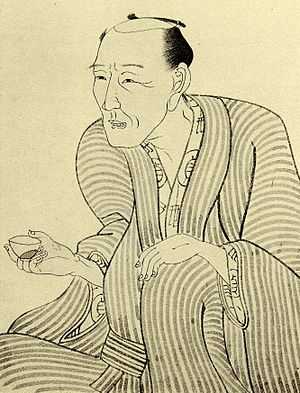Jippensha Ikku

Jippensha Ikku (十返舎 一九, 1765 – September 12, 1831) was the pen name of Shigeta Sadakazu (重田 貞一), a Japanese writer active during the late Edo period of Japan. He lived primarily in Edo in the service of samurai, but also spent some time in Osaka as a townsman. He was among the most prolific yellow-backed novel (黄表紙 kibyōshi) writers of the late Edo period — between 1795 and 1801 he wrote a minimum of twenty novels a year, and thereafter wrote sharebon (洒落本), kokkeibon (滑稽本) and over 360 illustrated stories (合巻 gōkan).
Biography
Little is known of Jippensha Ikku's adult life. He was married three times, two of which were quickly ended by fathers-in-law who could not understand his literary habits.
The following anecdotes are told about him. He accepted poverty with good humor and, having no furniture, hung his bare walls with paintings of the furniture he might have had. On holidays he sacrificed to the gods with pictures of excellent offerings. Being presented with a bathtub in the common interest, he carried it home inverted on his head, and overthrew with ready wit the pedestrians who fell his way. When his publisher came to see him, Jippensha invited him to take a bath. While his invitation was being accepted he decked himself in the publisher's clothes and paid his New Year's Day calls in proper ceremonial costume. These anecdotes are now widely regarded as apocryphal.[1] The most reliable sources cite Jippensha as being surly and unpleasant in person.
His masterpiece, Tōkaidōchū Hizakurige, was published in twelve parts between 1802 and 1822. Aston calls it "the most humorous and entertaining book in the Japanese language."[2]
In 1831, Jippensha became paralyzed. On his deathbed, Jippensha is said to have enjoined his pupils to place upon his corpse, before his cremation, certain packets which he solemnly entrusted to them. He died on August 7 of that year. At his funeral, prayers having been said, the pyre was lighted, whereupon it turned out that the packets were full of firecrackers, which exploded merrily. Jippensha had kept his youthful promise that his life would be full of surprises, even after his death. As above, this tale is most likely not true.[1]
He ashes were buried in Asakusa in Tokyo at the Zenryu temple.
Works
- Hizakurige or Shank's Mare: Japan's Great Comic Novel of Travel and Ribaldry by Ikku Jippensha. Translated by Thomas Satchell. Rutland, Vermont: Charles E. Tuttle Company. 1960. ISBN 0-8048-0524-5
- Footing It Along the Tōkaidō (東海道中膝栗毛 tōkaidōchū hizakurige)
References
- ↑ 1.0 1.1 Translator's Preface to Hizakurige. Thomas Satchell. Rutland, Vermont: Charles E. Tuttle Company. 1960. ISBN 0-8048-0524-5
- ↑ 'A history of Japanese literature'. W.G. Aston. New York: D. Appleton and company. 1916.
Further reading
- Earl Miner, Hiroko Odagiri and Robert E. Morrell (1985). The Princeton Companion to Classical Japanese Literature. Princeton University Press. p. 172. ISBN 0-691-06599-3.
- Will Durant and Ariel Durant (1997). Our Oriental Heritage. MJF books. ISBN 1-56731-012-5.
|